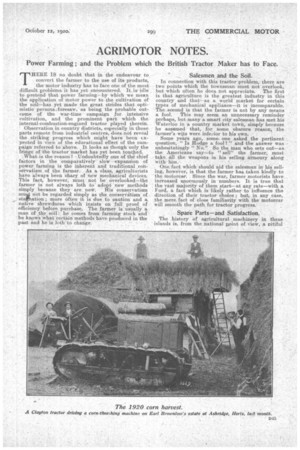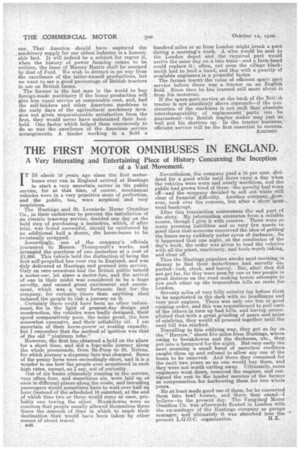AGRIMOTOR NOTES.
Page 57

Page 58

If you've noticed an error in this article please click here to report it so we can fix it.
Power Farming ; and the Problem which the British Tractor Maker has to Face.
HERE IS no doubt that in the endeavour to convert the farmer to the use of its products,
the motor industry has to face one of the most difficult problems. it has yet encountered. It. is' idle to pretend that power farming—by which we mean the application of Motor power to the cultivation of the soil—has yet made the great strides that optimistic persons,foresaw, as being the probable outcome of the war-time campaign for intensive cultivation, and the prominent part which the internal-combustion-engined tractor played therein.
Observation in country districts, especially in those parts remote from industrial centres, does not reveal the striking progress which might have been expected in view of the educational effect of the campaign referred to above. It looks as though only the fringe of the tractor market has yet been touChed. W.hat-is the reason ? Undoubtedly one of the chief '
factors in the -comparatively slow expansion • of power farming is the inherent and traditional conservatism of the farmer. As a class agriculturists have always been chary of new mechanical devices. This fact, however, must not be overlooked—the farmer is not always loth to adopt new methods simply because they are. new His conservatism mug not be regarded simply as the Conservatism' of stariation; more Often it is due to caution and a native shrewdness which insists on full proof of efficiency before purchase. The farmer is usually a man of the soil: he comes from farming stock 'and he knows .what certain methods have produced in the
past and he is loth to change. • -
Salesmen and the Soil.
In connection with this tractor problem, there are two points which the townsman must not overlook, . but which often he does not appreciate. The first is that agriculture is the greatest industry in this country and that—as a world market for certain types of mechanical appliance—it is incomparable. The second is that the farmer is not by any means a fool. This may seem an unnecessary reminder perhaps, but many a smart city salesman has met his Waterloo in a country market town, simply 'because .assumed that, for some obscure reason, the farmer's wits were infeHor to his own.
Some years ago someone asked the pertinent question, "Is Hodge a fool?" and the answer was unhesitatingly "No." So the man who sets out—as the Americans say—to " sell" the farmer, must take all the weapons in his selling armoury along with him.
One fact which should aid the salesman in his selling, however; is that the farmer has taken kindly to the motorcar. Since the war, farmer motorists have _ Increased enormously in numbers. It is true that the vast majority of them start—at any rate—with a Ford, a fact which is likely rather to influence the direction of their tractor choice ; but, in any case, the mere. fact of close familiarity with the motorcar will smooth the path for tractor progress.
Spare Parts—and Satisfaction.
The history of agricultural machinery in these islands is, from the national point of view, a pitiful one. That America should have captured the _machinery supply for our oldest industry is a lamentable fact. It will indeed he a subject for regret if, when the history of power farming comes to be written, the fame of Massey Harris shall be usurped by that of Ford. We wish to detract in no way from the excellence of the latter-named productions, but we want to see a good percentage of British tractors in use on British farms.
'The farmer is the last man in the world to 'buy foreign-made machinery if the home production will give him equal service at comparable cost, and, had the self-binders and other American machines in the early days of the agricultural machinery invasion not given unquestionable satisfaction from the first, they would never have maintained their foothold. One factor which helped them enormously to do so was the excellence of the American service arrangements. A binder working in a field a hundred miles or so from London might break a part during a morning's work. A wire would be sent to the London depot and the required part would arrive the same day on a late train—and a farm-hand could replace it ; often, not even the village blacksmith had to lend a hand, and this with a paucity of available engineers is a powerful factor. The farmer learnt the value of efficient spare part ' service before there was a tractor on an English field. Since then he has learned still more about it from his motorcar.
If the spare part service at the back of the British tractor is not absolutely above reproach—if the construction of the machines is not such that absolute interchangeability of replacement parts can be guaranteed—the British tractor maker may just as well put his shutters up. In the tractor business, efficient service will be the first essential to success.
AGRIMOT.




























































